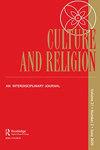A queer relationship? The construction of a New Zealand LGBTQ community choir and its host church
IF 0.5
0 RELIGION
引用次数: 1
Abstract
ABSTRACT This article examines how a secular lesbian, gay, bisexual, transgender, queer (LGBTQ) community choir in New Zealand negotiates a relationship with sacred repertoire, and the church in which the choir is located. A mixed-methods study included semi-structured interviews with 26 current and past members, musical directors and a church representative. Themes that emerged included tensions between religion and an LGBTQ cultural secularism, intersections of reconciliation and affirmation and the identity constitutive uses of space. Findings suggest that although, as LGBTQ-identified people, secularism is an important identity, sacred music is pleasurable. The choir provides church-like functions, through a sense of community, ritual and an environment for spiritual reflection and the practice of values. The church location offers reconciliation for those with Christian backgrounds. Benefitting each other, the choir gives St. Andrew’s legitimacy in its identity as an LGBTQ-inclusive church, and the church space has a queering effect on the presentation of the choir.酷儿关系?新西兰LGBTQ社区合唱团及其主教堂的建设
本文探讨了新西兰的一个世俗的女同性恋、男同性恋、双性恋、跨性别、酷儿(LGBTQ)社区合唱团是如何与神圣的剧目以及合唱团所在的教堂协商关系的。一项混合方法的研究包括对26名现任和前任成员、音乐总监和一名教会代表进行半结构化采访。出现的主题包括宗教与LGBTQ文化世俗主义之间的紧张关系,和解与肯定的交叉点以及空间的身份构成使用。研究结果表明,尽管作为lgbtq人群,世俗主义是一种重要的身份认同,但神圣的音乐是令人愉悦的。唱诗班提供类似教堂的功能,通过社区意识、仪式和精神反思和价值观实践的环境。教堂的位置为那些有基督教背景的人提供了和解。唱诗班相互受益,赋予了圣安德鲁作为一个包容lgbtq的教堂的身份合法性,教堂空间对唱诗班的呈现产生了酷儿效应。
本文章由计算机程序翻译,如有差异,请以英文原文为准。
求助全文
约1分钟内获得全文
求助全文

 求助内容:
求助内容: 应助结果提醒方式:
应助结果提醒方式:


